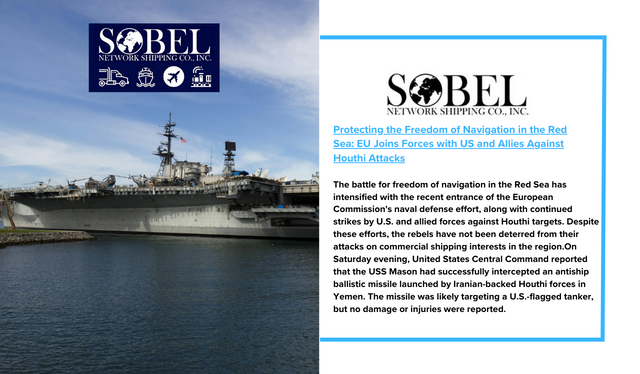The battle for freedom of navigation in the Red Sea has intensified with the recent entrance of the European Commission’s naval defense effort, along with continued strikes by U.S. and allied forces against Houthi targets. Despite these efforts, the rebels have not been deterred from their attacks on commercial shipping interests in the region.On Saturday evening, United States Central Command reported that the USS Mason had successfully intercepted an antiship ballistic missile launched by Iranian-backed Houthi forces in Yemen. The missile was likely targeting a U.S.-flagged tanker, but no damage or injuries were reported. This is just the latest in a string of attacks on commercial vessels in the Red Sea, with at least 59 incidents reported since February 21.
Last week, the European Union’s Naval Force (EUNAVFOR) Operation Aspides joined the U.S. and French naval operations in the region to protect the freedom of navigation for ships in the Red Sea. This marks the EU’s first mission specifically dedicated to protecting maritime trade in this area. Unlike the U.S. and UK, who have taken both defensive and offensive measures against the Houthis, the Aspides operation is solely focused on intercepting Houthi drones and missiles to protect commercial vessels.Trade leaders have been urging more countries to join the military effort in the Red Sea, as the attacks not only impact commerce but also have a ripple effect on global trade. Steven Lamar, CEO of the American Apparel and Footwear Association, stressed the need for a united front in order to maintain a zero-tolerance approach towards these attacks.
“It is long past time for every country to align with these efforts so we can collectively stop and prevent attacks on seafarers, their cargo, and their equipment,” he said.The EU’s involvement in the crisis comes at a critical time, with the Houthis ramping up their attacks on commercial vessels in the Red Sea. On Wednesday, Houthi foreign ministry official Hussein al-Azzi claimed that the rebel army had “constructive talks” with the EU, but the EU has denied any coordination with the group. Instead, the EU has condemned the attacks as a violation of international law and a threat to maritime security and global trade. “They need to cease immediately,” said EU spokesman Peter Stano. “This is a very clear message delivered consistently to the Houthis.”In the midst of this crisis, a war of misinformation has also emerged. The Houthis have a history of making false claims and using old, unrelated videos to support their messaging. Recently, they claimed to have sunk the UK-owned bulk carrier M/V Rubymar, but the ship was actually abandoned by the crew after sustaining significant damage.
The U.S. Central Command released satellite photos of the vessel on Friday, showing the extent of the damage and the potential for an environmental disaster if the 41,000 tons of fertilizer on board spills into the Red Sea.Despite the EU’s increased presence in the region, the attacks have continued, with the Houthis showing no signs of backing down. Some experts believe that greater cooperation between the EU and U.S. forces could be beneficial in deterring the Houthis. “If the EU mission is well integrated with U.S. forces already present, it would be a great thing,” said U.S. Navy Rear Admiral (Ret.) Mark Montgomery, a senior fellow at the Foundation for Defense of Democracies.
“This interoperability can easily be provided through the use of NATO standard data links which are present on all these warships.”While the EU’s role in this crisis is primarily defensive, there is also a push for a potential investigation into Yemen’s failure to protect the Law of the Sea. Federal Maritime Commissioner Carl Bentzel has proposed looking into the impact of Yemen’s actions on global maritime trade, with the potential assistance of the State Department. “We need an investigation to determine whether the actions emanating in Yemen cause unfavorable conditions to shipping in the foreign commerce,” said Bentzel.The economic impact of the attacks in the Red Sea is far-reaching, with Egypt alone estimated to lose upwards of $5 billion in revenue this year due to the disruptions in the Suez Canal. With the stakes so high, the need for a unified effort to protect the freedom of navigation and ensure the safety of maritime workers is more pressing than ever.


